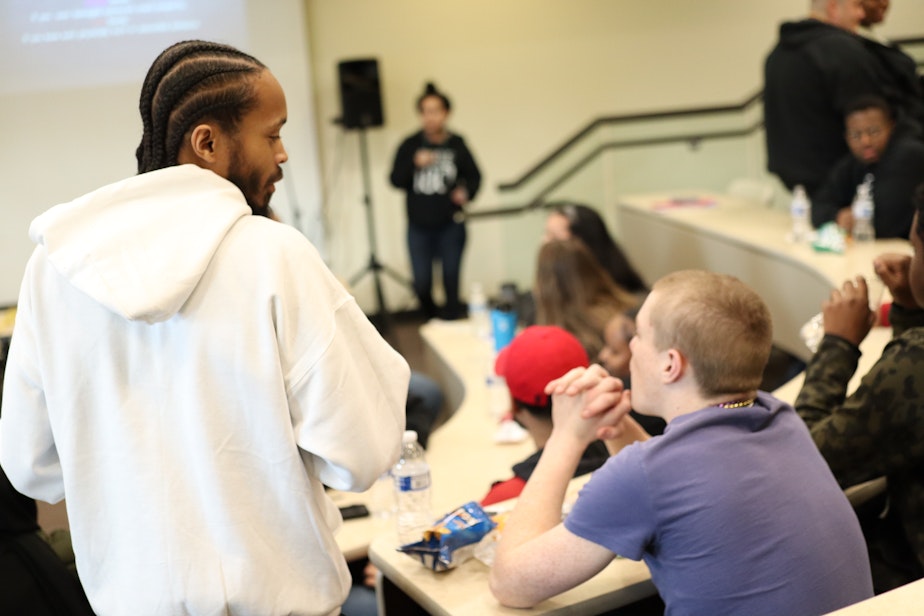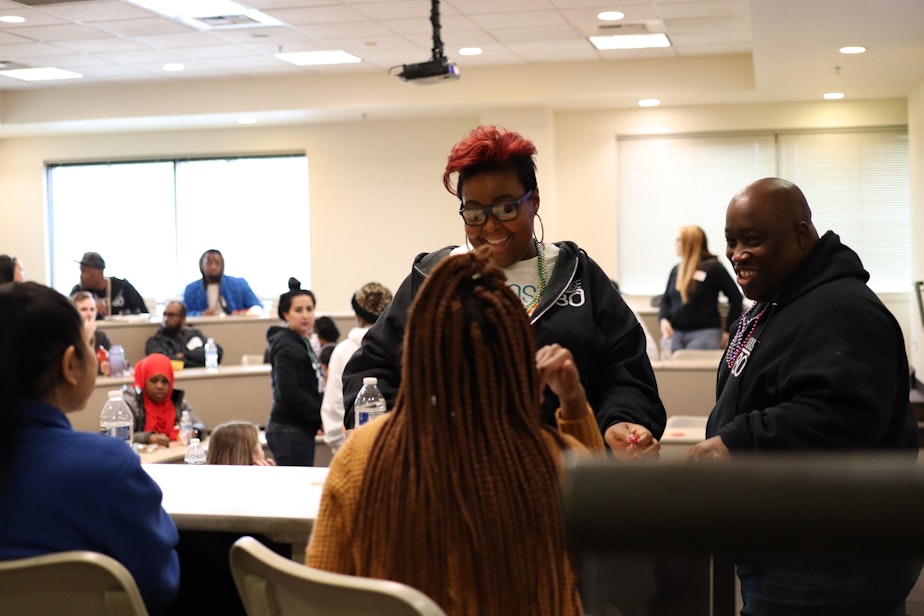A 13 year old goes on a joyride. Thanks to this program, she won't wind up in court

Last summer, Black Lives Matter protesters called on governments to cut funding for police, jails and courts.
They wanted to replace that structure with community programs to redirect people accused of committing crimes. This year King County is increasing funding for these community programs, especially for youth.
One of the participants is a 13-year-old, who we’re calling K, which is her first initial. K seems pretty typical for girls her age. She likes the Olive Garden restaurant, and going to a shopping center with her friends.
“We usually just walk to the park or Kent Station,” she said.
Also typical: She’s pushing the limits with her mom. Last summer, K and her friend were alone in her mom’s car, and the friend decided to drive the car.
“They went on a little joyride, went and picked up their girlfriend across town,” K's mom said.
A relative told K's mom.
“She’s like, your daughter stole your car,” K's mom said. “They drove me over to where the cop had pulled them over, and was holding them until the parents came and got them.”
K's mom was so angry that she initially wanted to press charges against her daughter. K and her friend both faced possible felonies — K for being a passenger in a stolen vehicle.
But soon, the family heard from Marleisha Cox, a navigator for the intervention program Choose 180. Cox did the legwork to keep K out of the court system.
“I sent emails to the prosecutor and probation, to try to get them all on the same page about making sure we can get this case diverted,” Cox said.
Instead of going through the courts, the probation counselor assigned K to attend a support program with other girls.
“We meet on Zoom calls,” K said.
She gives the program decent reviews. If she attends the required number of meetings, the case against her will be sealed and dismissed. Of course, there were repercussions at home.
“She got grounded. For a week,” K's mom said. (K noted triumphantly that she still managed to see her friends from home.)
Cox said many kids that age can’t conceive of how a criminal conviction could upend their lives. That’s why it’s her job to minimize their involvement with the court system.
“When you’re younger, you don’t necessarily know the impact of what’s going on," Cox said. "Things aren’t taken as seriously, you just don’t understand.”
Cox said parents will get frustrated and may believe punishment is the best way to get their child on the right track.
“But it’s not,” she said. “A lot of the time, it’s engaging and meeting the young person where they’re at."

Sean Goode is the executive director of Choose 180.
“What was 'just' is not treating a 13-year-old as a felon for hopping in a car with a friend and engaging in a series of poor decision-making,” he said, “when that’s not indicative of who she is.”
The past two years have been a tipping point in which King County prosecutors sent more juvenile cases to intervention programs like Choose 180 than they filed in court.
But Goode said the families they work with asked them to go further.
“Universally they all said the less involved that the court system can be, whether that’s judges, or probation, prosecution, public defense, the better the outcome for all of us,” he said.
Goode said that’s because the court tends to have one-size-fits-all outcomes rather than the interventions more tailored to each person’s situation.
King County Prosecutor Dan Satterberg said the county has listened, and created something for juvenile cases called Restorative Community Pathways.
“It will not involve the court, it will not involve the juvenile probation counselor or any of that system,” Satterberg said.
This expanded diversion process will address serious juvenile cases including unlawful gun possession.
Satterberg said it’s a last chance to get a young person to change paths before they face charges as an adult. King County is also creating a Community Diversion Program for adults facing their first nonviolent felony charges. That program will focus on nonviolent offenses like property crimes, and adults will only be eligible once.
Satterberg said both programs are getting off the ground later this year.
“We’re talking up to 1000 adults who are facing their first felony and another 500 or so juvenile offenders who can be received by people who will be more persuasive to them and more helpful to them,” he said.
If the people accused of those crimes fulfill the terms of the intervention program – like taking part in a restorative justice process with the victim, or staying in school and not reoffending — their cases will be dismissed. If they don't, then prosecutors will file the charges in court.
The King County Council appropriated $6.2 million for the youth and $2.7 million for the adult programs over the next two years. Satterberg said that funding is one impact of this year’s widespread protests calling for changes to policing, and most of the money will go to community groups to cover every area and population of the county.
“We have a well-funded option now,” he said. “Up until now it’s been really up to my office to come up with the money to pay for these alternatives and now we have a significant amount of money coming from the county.”
It includes $90,000 in public restitution, so that crime victims can be compensated even if the offender can’t pay them. Satterberg said the average restitution sought is about $240.
He said the funding for these new community programs will be offset by lower caseloads for courts, prosecutors, public defenders and probation staff.
Mike Diaz is the chief judge in the juvenile division of the King County Superior Court. He said he’s open to making sure only the most serious juvenile cases end up in his courtroom.
“If the court can have a smaller footprint – and I think it can – and we can do this in a rigorous, data-driven and responsible way, then yes we are supportive,” he said.
But Diaz said the county budget requires an assessment of these new diversion programs before the court’s funding can be reduced.
“To look at the kinds of cases being diverted, the number of cases, the community supports that are being set up, and see what effect that’s having on the court docket,” he said. “So there won’t be cuts to the court system of any kind until 2022 at the earliest.”
Still, Sean Goode with Choose 180 said he’s celebrating this prospect.
“Where we do things differently in King County is, we’re reducing the footprint of these systems of injustice, and we’re expanding the footprint of community,” he said, “so we can truly live in a world where young people get community instead of convictions.”
Goode said it will take time to get the right programs in place so that someone like Marleisha Cox is on hand for every family. But Goode believes these new community programs will result in reduced recidivism, that youth and adults who participate will get help and make the necessary changes in order to not reoffend.




